Wittenberge
Wittenberge (German: [ˌvɪtənˈbɛɐ̯ɡə] (![]() listen)) is a town of eighteen thousand people on the middle Elbe in the district of Prignitz, Brandenburg, Germany.
listen)) is a town of eighteen thousand people on the middle Elbe in the district of Prignitz, Brandenburg, Germany.
Wittenberge | |
|---|---|
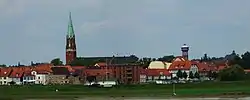 | |
 Coat of arms | |
Location of Wittenberge within Prignitz district  | |
 Wittenberge  Wittenberge | |
| Coordinates: 53°00′N 11°45′E | |
| Country | Germany |
| State | Brandenburg |
| District | Prignitz |
| Subdivisions | 7 Stadtteile/Stadtbezirke |
| Government | |
| • Mayor | Oliver Hermann (—) |
| Area | |
| • Total | 50.44 km2 (19.47 sq mi) |
| Elevation | 25 m (82 ft) |
| Population (2019-12-31)[1] | |
| • Total | 16,925 |
| • Density | 340/km2 (870/sq mi) |
| Time zone | UTC+01:00 (CET) |
| • Summer (DST) | UTC+02:00 (CEST) |
| Postal codes | 19322 |
| Dialling codes | 03877 |
| Vehicle registration | PR |
| Website | www.wittenberge.de |
Geography
Wittenberge is situated at the right (north-eastern) bank of the middle Elbe at its confluence with the Stepenitz and Karthane in the German district of Prignitz. Within the same district, the town borders the Ämter Lenzen-Elbtalaue and Bad Wilsnack/Weisen as well as the district capital Perleberg. The Verbandsgemeinde Seehausen (Altmark) in the district of Stendal, Saxony-Anhalt, lies on the opposite side of the Elbe.
History
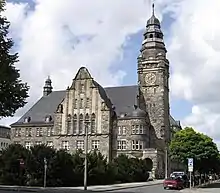
The site was marked out in 1239 at Wendischwalde and in 1300 the Saxon king, Otto I, established the settlement. It grew slowly but steadily. The town castle (1669) survives as the town museum but it suffered fires in 1686 and 1757, and floods from the Elbe in 1709 and 1761. Nevertheless, because of its position, it prospered from the opening of the Berlin–Hamburg steamship traffic. By 1823 milling, processing and refining of foodstuffs were important industries. In 1846 the railway came and a silk factory was built, followed by a chemical factory in 1849. The Reichsbahn railway workshops were established in 1875 and the world-famous Singer Sewing Machine Company opened in 1903 its German manufacturing site Singer Nähmaschinenfabrik Wittenberge. By 1914 the Rathaus was built.
From 15 August 1942 until 17 February 1945 a concentration camp was established in Wittenberge. The camp was a subcamp to the Neuengamme concentration camp.[2]
Between the wars much architecture characteristic of the period was built in the form of workers' housing for the rapidly increased population. It suffered as most German towns did during WW II. Only the railway workshops remain as significant employers of the old industries but the large, skilled workforce remains for the newer industries of precision engineering and applied chemistry.
Demography
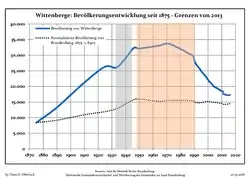 Development of population since 1875 within the current Boundaries (Blue Line: Population; Dotted Line: Comparison to Population development in Brandenburg state; Grey Background: Time of Nazi Germany; Red Background: Time of communist East Germany)
Development of population since 1875 within the current Boundaries (Blue Line: Population; Dotted Line: Comparison to Population development in Brandenburg state; Grey Background: Time of Nazi Germany; Red Background: Time of communist East Germany)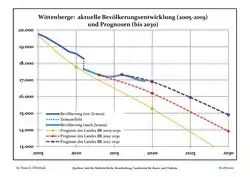 Recent Population Development and Projections (Population Development before Census 2011 (blue line); Recent Population Development according to the Census in Germany in 2011 (blue bordered line); Official projections for 2005-2030 (yellow line); for 2014-2030 (red line); for 2017-2030 (scarlet line)
Recent Population Development and Projections (Population Development before Census 2011 (blue line); Recent Population Development according to the Census in Germany in 2011 (blue bordered line); Official projections for 2005-2030 (yellow line); for 2014-2030 (red line); for 2017-2030 (scarlet line)
|
|
|
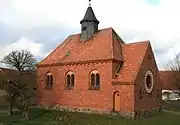


Mayor
- 1993–2008: Klaus Petry (SPD)
- since 2008: Oliver Hermann (independent)
Oliver Hermann was reelected in 2016 with 94,8% of the vote.
International relations
Twin towns – Sister cities
Wittenberge is twinned with:
 Châlons-en-Champagne, France
Châlons-en-Champagne, France Elmshorn, Germany
Elmshorn, Germany Razgrad, Bulgaria
Razgrad, Bulgaria
Notable residents
- Carl Lindenberg (1850–1928), jurist and philatelist
- Herman C. Schultz (b. 1860), politician
- Otto Telschow (1876–1945), politician of the NSDAP, Gauleiter, member of the Reichstag
- Friedrich Burmeister (1888–1968), politician of the GDR (Minister of mail and telecommunications)
- Emanuel Hirsch (1888–1972), Protestant theologian
- Klaus Havenstein (1922–1998), German actor and cabaret artist
- Ulrich Woronowicz (1928–2011), Protestant pastor, theologian and social activist
- Ulrich Makosch (1933–2008), journalist (television of the GDR)
- Friedrich Schorlemmer (born 1944), theologian
- Norbert Klaar (born 1954), sports shooter, Olympic champion 1976 (fast fire pistol)
- Uwe Potteck (born 1955), sportsman, Olympic champion 1976 (free pistol)
- Richard Kruspe (born 1967), musician, guitarist of the band Rammstein
- Stefanie Thurmann (born 1982), sports shooter
References
- "Bevölkerung im Land Brandenburg nach amtsfreien Gemeinden, Ämtern und Gemeinden 31. Dezember 2019". Amt für Statistik Berlin-Brandenburg (in German). July 2020.
- The camp is listed as No. 1587 Wittenberge, Kreis Wittenberge in the official German list of concentration camps Verzeichnis der Konzentrationslager und ihrer Außenkommandos Archived 23 April 2009 at the Wayback Machine (in German)
- Detailed data sources are to be found in the Wikimedia Commons.Population Projection Brandenburg at Wikimedia Commons
External links
![]() Media related to Wittenberge at Wikimedia Commons
Media related to Wittenberge at Wikimedia Commons